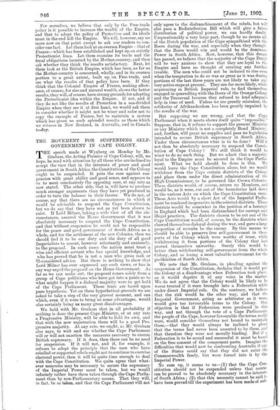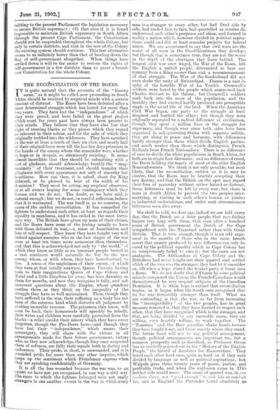THE MOVEMENT FOR SUSPENDING SELF- GOVERNMENT IN CAPE COLONY. T HE
speech made at Wynberg on Monday by Mr. Graham, the Acting Premier of Cape Colony, will, we hope, be read with attention by all those who are inclined to accept the view that in the interests of peace and good aovernment in South Africa the Constitution of the Colony ought to be suspended. It puts the case against sus- pension with great ability and good sense, and appears to us to meet conclusively the opposing case, at any rate as now stated. The other side, that is, will have to produce much stronger arguments than they have yet produced in order to turn the balance in their favour. We do not, of course, say that there are no circumstances in which it would be advisable to suspend the Cape Constitution, but we do say that they have not as yet been shown to exist. If Lord Milner, taking a wide view of all the cir- cumstances, assured the Home Government that it was absolutely necessary to suspend the Cape Constitution, and that without suspension he could not be responsible for the peace and good government of South Africa as a whole, and for the settlement of the new Colonies, then we should feel it to be our duty and the duty of all good Imperialists to assent, however reluctantly and anxiously, to the proposal. In such cases the nation must trust a wise and efficient servant who has special knowledge, and who has proved that he is not a man who gives rash or ill-considered advice. But there is nothing bto show that Lord Milner has ever expressed any such views, or has in any way urged the proposal on the Home Government. As far as we can make out, the proposal comes solely from a group of Cape politicians who have got into a panic as to what might happen if a disloyal majority were to get hold of the Cape Parliament. These fears are based upon pure hypothesis. Yet on these hypothetical grounds we are asked to take a step of the very gravest moment, and one which, even if it were to bring us some advantages, would also certainly bring us many great disadvantages.
We hold with Mr. Graham that in all probability if nothing is done the present Cape Ministry, or at any rate a Progressive Ministry, will be able to hold its own, and that with the new registration there will be a good Pro- gressive majority. At any rate, we ought, as Mr. Graham also says, to wait and see whether the Cape Parliament will or will not sanction the measures necessary to ensure British supremacy. If it does, then there can be no need for suspension. If it will not, and if, for example, it refuses to adopt the principle that the men who have rebelled or supported rebels ought not to continue to exercise electoral power, then it will be quite time enough to deal with the Cape Constitution. We quite agree that what- ever measures may be necessary to secure the supremacy of the Imperial Power must be taken, but we would infinitely rather have them taken through the Cape Parlia- ment than by non-Parliamentary means. That they will, in fact, be so taken, and that the Cape Parliament will not only agree to the disfranchisement of the rebels, but will also pass a Redistribution Bill which will give a fairer distribution of political power, we can hardly doubt. Unquestionably a very large part, though by no means all. of the Dutch population of the Cape sympathised with the Boers during the war, and especially when they though: that the Boers would win and would be the dominant Power in South Africa. Now, however, that this dream has passed, we believe that the majority of the Cape Dutch will be very anxious to show that they are loyal to the Empire and have no thought of creating any further trouble. The men who could not be induced to rise even when the temptation to do so was as great as it was during portions of the last three years are not likely to take any very active steps at present. They are far more likely, while acquiescing in British Imperial rule, to find themselves engaged in quarrelling with the Boers of the Orange Colony and the Transvaal because they refused to lend adequate help in time of need. Unless we are greatly mistaken, the solidarity of Afrikanderdom has been greatly impaired by the results of the war.
But supposing we are wrong, and that the Cape Parliament when it meets shows itself quite "impossible." Suppose, that is, it refuses to support the present Ministry or any Ministry which is not a completely Bond Ministry, and, further, will grant no supplies and pass no legislation intended to secure British supremacy in South Africa. Under those circumstances what is to be done ? Will it not then be absolutely necessary to suspend the Consti- tution of Cape Colony ? We still think it would be wiser to do no such thing. But we admit that a majority loyal to the Empire must be secured in the Cape Parlia- ment. What we hold should be done is this. We would leave the Cape Constitution alone, but we would withdraw from the Cape certain districts of the Colony and place them under the direct administration of the High Commissioner, to be governed like Crown Colonies. These districts would, of course, return no Members, and would be, as it were, cut out of the boundaries laid down in the various Acts on which the Cape Constitution rests. Those Acts would by a. short Act of the Imperial Parlia- ment be rendered inoperative in the selected districts. Those districts would be somewhat in the position of a borough in England which had been disfranchised for corrupt and illegal practices. The districts chosen to be cut out of the Cape Constitution would, of course, be the districts which showed themselves disloyal during the war, and gave a large proportion of recruits to the enemy. By this means we should be able to preserve free self-government in those parts of the Colony which were worthy of trust, while withdrawing it from portions of the Colony that had proved themselves unworthy. Surely this would be better than withdrawing self-government from the whole Colony, and so losing a most valuable instrument for the pacification of South Africa.
We note that Mr. Graham, in pleading against the suspension of the Constitution, declares that it would put the Colony at a disadvantage when Federation took place. as it would deprive it of any voice in the matter. We do not agree that the Colony would be likely to be worse treated if it were brought into a Federation while under direct Imperial rule. On the contrary, we believe that the risk would be the other way, and that the Imperial Government, acting as arbitrator as it were, would give too favourable terms to the Colony. Our objection is that if Federation were produced in this way, and not through the vote of a Cape Parliament, the people of the Cape, however favourable the terms really were, would consider themselves not bound to maintain them,—that they would always be inclined to plead that the terms had never been assented to by them, and that therefore they were not morally binding. But if a Federation is to be sound and successful it must be based on the free consent of the component parts. Imagine the difficulties that would now be confronting Australia if any of the States could say that they did not enter the Commonwealth freely, but were forced into it by the Imperial Power.
To sum up, it seems to us—(1) that the Cape Con- stitution should not be suspended unless that course can be proved to be absolutely necessary in the interests of South Africa ; (2) that this necessity cannot be said to have been proved till the experiment has been made of sub-







































 Previous page
Previous page